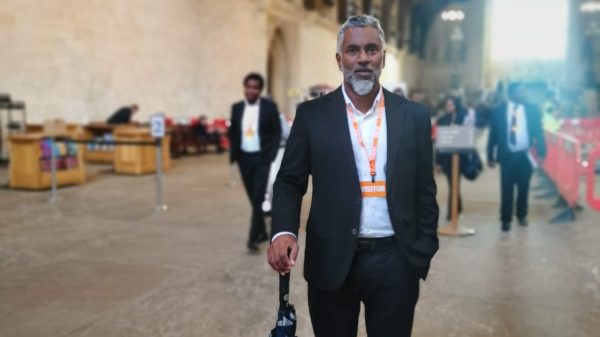
Despite being about to be entrusted with billions of EU funds, serious questions are being asked of Portugal, with the country’s judicial system alone being branded “not fit for purpose”.
That is one of the messages to emerge from an online conference about whether effective oversight can hasten realistic reform.
The conference on Tuesday (25 May) heard that €45 billion will be allocated to Portugal over the next few years from the EU’s Next Generation fund.
The fund is meant to help all EU member states, including Portugal, recover economically from the crippling pandemic.
But, the conference was told, question marks still hang over Portugal’s credentials to receive such funding, not least as the EU has repeatedly highlighted the need for judicial reform in Portugal.
Participants heard that the Commission can, if it suspects recipient governments of corruption or foul play, block disbursements of EU money, including from the Recovery and Resilience Facility (RRF), the official name for the coronavirus funding.
Despite its economic recovery in recent years, concerns about infringements of the rule of law in Portugal have gathered pace, not least following the collapse of Banco Espírito Santo in 2014.
Stories of mismanagement and litigation surrounding Novo Banco have blighted the image of Portugal as a place to do business.
All this comes at a time when Portugal is very much in the spotlight with it holding the rotating EU presidency.
The event, called ‘Recovery and Resilience Facility: Can effective oversight bring about true reform?,’ featured a range of speakers, including Ana Costillas, from Recover Portugal, a group of European financial institutions holding Novo Banco bonds.
They invested in the reform and recovery of the Portuguese economy, which has led some to describe it as a “poster boy” of reform and are taking action against the retransfer of Novo Banco notes in 2015.
Each member state must submit its own RRF plan to the EU for its approval and Costillas, in an opening statement, noted that prior to the Portuguese plan being accepted by the European Comission the executive needs to ask Portugal to solve the BES/ Novo Banco case.
She said the European Parliament, Court of Auditors (ECA) and European Public Prosector’s Office (EPPO) should also have substantial oversight roles in the disbursement of Portugal’s RRF funding.
The question of how the EU would enforce the rule of law as a condition of receiving RRF monies was posed to Ivana Maletic, a member of Court of Auditors, who is responsible for the ECA opinion on the RRF regulation.
Maletic said that if a country does not follow fundamental Treaty obligations, then it is “fair and just that that member states does not benefit from the funds”.
If there is a rule of law problem there is the huge risk that the country will not use it in the proper way, legal or regular way.
The official said the EU also had, at the same time, to be cautious not to block the implementation of funds, adding: “We have to strike the right balance between what we want to achieve and conditions”.
“The rule of law is also connected to the judicial system. Some reforms will take a long time, and are ongoing, but we expect to see change in a positive sense.”
Costillas, even so, said that the rule of law and independence of the justice system was paramount, adding: “We’ve been suffering from a highly-politicised judicial system in Portugal”.
In the case of Portugal, she pointed out that both the EPP and RE groups in the European parliament had complained about Portugal’s appointment of their EPPO national prosecutor, which raises concerns and “shows how politicised the system is”.
She told the conference: “Digitilization of the judicial system is great, but they need first to look into past cases that have been blocked for political reasons. This does not look good for the EU. Other institutions must put pressure on member states to solve these cases.”
The conference was timely as the Portuguese EU presidency will host a summit in June in Lisbon on the quality and efficiency of modern public administrations in Europe.
The event heard that one part of the Recovery Fund finance will come from the Commission’s own borrowing. Another substantial part will come from financing on the international markets, through the purchase of EU bonds by private investors. The Commission, it was said, has encouraged member states to crowd in private investment to multiply the impact of the RRF.
Portugal has applied for grants worth more than 4% of its Gross Domestic Product, a staggering €45 billion over the next few years, from the EU’s Next Generation fund.
But the virtual debate this week comes amid a backdrop of continuing concern about the situation in Portugal and its suitability for and ability to manage such huge EU funding.
Portugal suffers of serious systemic problems in its administrative justice which are nationally known by the relevant authorities, including the administrative courts themselves.
The latest country-specific recommendations of 2019 and 2020 for Portugal are, among others, that it increases the efficiency of its administrative and tax courts. According to the latest EU Justice Scoreboard from 2017, Portugal is amongst the EU countries with the highest number of pending civil and commercial cases, with 12 cases per 100 inhabitants, against just two in France and six in Italy.
In recent years alternative means of dispute resolution, such as arbitration, have mushroomed due to the lack of reform and investment in the legal system.
The Portuguese government’s RRF plan – yet to be formally submitted to the EU – foresees €288 million of investment in “digital transition in justice”, with the aim of increasing the efficiency of the courts, especially the administrative and tax courts, including the development and modernisation of the technological and information infrastructure, the simplification and updating of services and training.
However, the conference heard that, currently, there are no measures to address the speedy resolution of old proceedings, or administrative disputes, and no solutions for the problems arising from the reassignment of cases and other structural problems identified.
Costillas said that for the EU to raise the €750b of debt in the financial markets to finance its Recovery and Resilience Fund at market prices, it must first demonstrate to international institutional investors that it will treat them fairly and equitably – first and foremost by resolving the BES / Novo Banco issue.
She asked: “Who is going to ensure that investors will be protected in national EU member state courts, now that intra-EU bilateral treatries have been terminated?
“What assurances can be given to investors that issues of grave concern at member state level in the judiciary will be resolved, prior to the issuing of any new bonds?”
Recover Portugal, the group she represents, is now pushing for satisfactory redress and has also called for member state reform, particularly of the judiciary, as a strict condition of receipt of EU Recovery Funds.
Respect for the rule of law in member states, particularly of political influence of the judiciary, is another demand.
The group also seeks redress for past investors. In the Portuguese example, this would apply to the Banco Espirito Santo and Novo Banco banking fiasco.
They also want reassurances for future investors who, as the group points out, are part-funding the EU Recovery Fund.
Representing the commission, Luc Tholoniat, of DG ECFIN, stressed at the conference that the delivery mode of the RRF money will be profoundly new at EU level, with disbursements “linked to results”.
So, it is all eyes now on Portugal – and the commission – to see if their fine words about reform and accountability will be backed up with firm action.
Costillas had a simple concluding message for the conference, saying Recover Portugal seeks “a clear commitment, a timeline and EU oversight”.





















